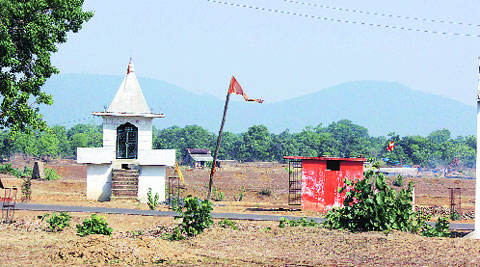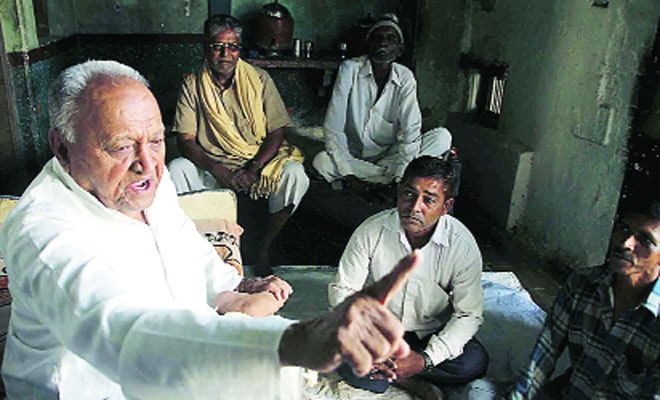 The controversial land where Dalits want to build a Buddha Vihar.
The controversial land where Dalits want to build a Buddha Vihar.SUMMARY
For the past three weeks, policemen have been taking turns to ensure round-the-clock vigil outside the Bahyababa temple, a spot that holds a “crucial link” to the killing of 50-year-old Dalit activist Sanjay Khobragade in Kawalewada village of Gondia. He was set on fire when he was sleeping in his courtyard in a Dalit settlement outside the village limit on the intervening night of May 16 and 17. He subsequently died on May 22.
A staunch follower of Dr B R Ambedkar, Khobragade had been fighting with the village politicos, all belonging to the dominant Powar caste, to get a patch of land from the Bahyababa temple trust to build a Buddha Vihar. With three temples having been built on the government land, Dalits in the locality have been demanding that the Panchayat Samiti make land available for a Buddha Vihar too. Dalits are in minority in the area with just 40 houses as against 1,500 Powar houses.
Six accused — Rushipal Tembhare (45), his wife and village sarpanch Madhuri Tembhare (40), Bhaulal Harinkhede (45), Punaji Thakre (58), Hemant Thakre (30) and Shriprakash Rahangdale (50), a doctor, deputy sarpanch and president of the Bahyababa temple trust — were arrested soon after Khobragade was set on fire. They were, however, released on bail following the arrest of Khobragade’s wife Devakabai (48) and her “paramour” Raju Gadpayle (42), a Dalit rickshaw-puller and neighbour.
The six accused are known in the area for their “strong political connections”. The trust members, after dodging the demand of village Dalits for years, had finally relented to allow a Buddha Vihar to be built next to the Bahyababa temple. The Tembhare couple had asked Khobragade to come after May 16, after the Lok Sabha election results. On the intervening night of May 16 and 17, however, he was doused with kerosene by “unknown persons” and set ablaze. In the five subsequent days that he battled for life, Khobaragade gave three separate statements to the village tehsildar and the police, each time naming the six.
Since he died, law demands that his statements be treated as his “dying declaration”, but the police rejected it, claiming that Khobragade had only expressed “suspicion” about the six accused. Gadpayale was arrested on May 19 and the police claimed that he confessed to hatching a conspiracy with Devakabai to kill Khobragade. “They had an illicit relationship and the deceased had seen them in a compromising position that night. So, both decided to kill him,” said public prosecutor Veena Bajpai.
Both Gadapayle and Devakabai, when produced in court, said they were tortured and made to confess to the crime they had not committed. The police are reluctant in taking the past instances related to the temple land into consideration, alleged Pradeep Khobragade (30), the deceased’s son who is fighting a legal battle. “In 2012, a few days after Ambedkar Jayanti, my father’s shop, which is just outside our house, was burnt down. It was a day after he (Khobragade) got involved in a skirmish with the Tembhares over the Buddha Vihar. In the last three years, my father had filed over six police complaints against the accused for denying us space to build a Vihar,” said Pradeep, who is staying away from the village where he runs a cycle repair shop.
The police are yet to record the family’s statement. Dalit activists and villagers alleged that the police were trying to save the real culprits and had falsely implicated Devakabai. “The police had tried similar tactics after Khairlanji massacre too. They had accused the deceased women of Khairlanji of having illicit relationships,” said lawyer Shailendra Gadpayle, who is handling Khobragade’s case.
Khobragade, in his statement, had claimed that he heard some voices before he was set ablaze and he distinctly recalled that the voices were of the accused. But the investigating officer told the court that “he was drunk and not in a stable state”. “Both have confessed to their crimes. First Gadapayle broke down before the police and…then Devakabai too confessed,” said Bajpai.
Sub-Divisional Police Officer, Tirora, Dilip Girhe told the court on May 26 that Devakabai and Gadpayle had known each other since childhood and had an affair for the last 30 years. “If one goes by the police’s claim, Gadpayle must have been 11 years old then,” said Pradeep.
Last week, the police allowed the six accused to be let out on a conditional bail of Rs 15,000 each, unopposed. Their lawyers are now appealing to have the bail conditions of not entering the village limits relaxed. The police, too, plan to file an application to discharge them from the case. Opposing Devakabai’s bail, the prosecution had told the court that they feared “communal tension”. Dalit villagers, however, vouched for the Khobragade family. “Like Sanjay, his wife too was actively agitating to get us a Vihar. She does not deserve such treatment,” said Sangeeta Borkar, a villager.
“My mother has lost everything, her husband, her dignity, and now the police are making her out to be an evil person. She is poor, but not weak. She will fight till the end and we will all fight for her,” said Pradeep
Read mor ehere- http://indianexpress.com/article/india/india-others/dalit-activists-murder-police-reject-dying-declaration-villagers-say-will-fight-till-the-end/99/

June 11, 2014 at 6:42 pm
I’ve petitioned Obama Administration to direct Indian regime to carve out a separate nation for Untouchable people in India
http://wh.gov/loJN1